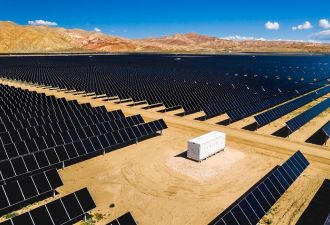When you're in the top ten in a residential solar finance field that includes SolarCity, SunPower, Sunrun and Vivint, it's possible for a significant player like Sunnova to get drowned out by the news, noise and hype.
Even when Sunnova's news is that the solar rooftop financier just closed on a $250 million fund in what the company calls "the largest-ever round of funding by a U.S. private residential solar company," bringing the company's total funding to near $500 million. Barclays was the placement agent in a round led by Franklin Square Funds and "sub-advised by GSO Capital Partners LP, the Credit Division of the Blackstone Group," as per a release. Franklin Square managed $13.6 billion in assets last year.
Sunnova has not revealed its previous funding sources, other than to say "Houston oil and gas money," and it has claimed that "it finances all systems off its own balance sheet rather than raising tax equity funds." That financial source is seemingly why Sunnova can pair up with Enphase to launch in the U.S. Virgin Islands and Puerto Rico.
Sunnova CEO John Berger told GTM in a recent interview, “We are bigger than people think, and we are seeing continued market share growth." Sunnova provides third-party financing for solar leases or PPAs through a network of local solar installers, while maintaining a solar service contract with each homeowner.
Despite the entire universe of solar financiers offering loan products, Sunnova is adamant about selling solar as a service and has no current plans to offer cash sales or loans, according to the CEO, despite some rumors to the contrary.
Berger sees his firm as "a power company" in residential solar competing with Sunrun, SolarCity, CPF and Vivint. "We are a private YieldCo," he said, adding, "We are not vertically integrated. We partner with installers to sell the service contract." Berger also said that Sunnova wasn't trying to do everything in the value chain; instead, "We are trying to be in the power business and sell power for as low [a cost] as possible."
Party like its 2017
The big question looming in the collective solar mind is what will happen on January 1, 2017, when the federal Investment Tax Credit (ITC) expires.
As far as CEO John Berger is concerned, Sunnova is "going to have a party" on New Year's Day 2017. He said that the ITC "is being used to artificially step up the tax basis on the deals" and that ultimately it "creates problems for the industry."
"We don't need the 30 percent," said the CEO. "We struck a deal -- we should keep the deal."
"We need to be heads-up competitive with centralized forms of power," said the CEO, adding, "It takes a lot more cost discipline -- we're doing it, and it can be done."
GTM Research's latest report on residential solar financing forecasts third-party ownership to peak at 68 percent of the residential PV market this year. GTM Research also expects the U.S. residential PV market to exceed 1 gigawatt for the first time in 2014.
_582_517_80.jpg)
Source: GTM Research's U.S. Residential Solar Financing 2014-2018 (click to enlarge)



